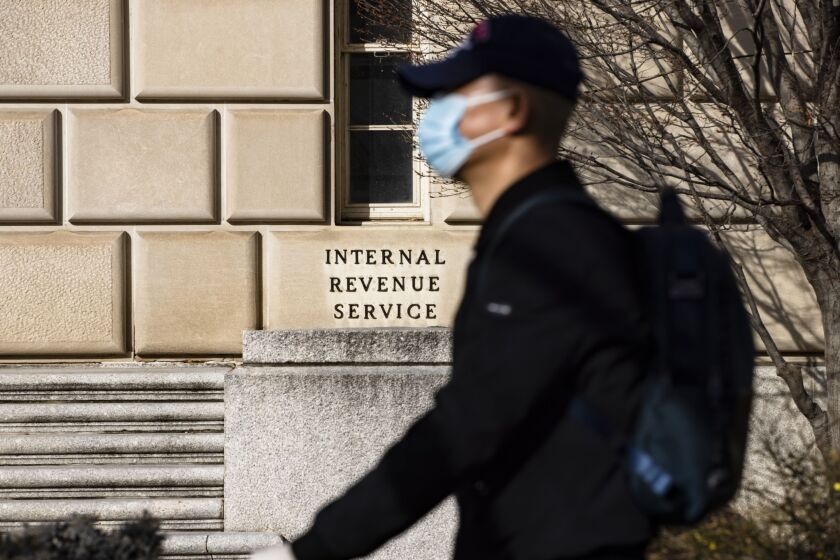The Internal Revenue Service will allow businesses that got their Paycheck Protection Program loans forgiven to write off expenses paid for with that money, shifting policy after Congress passed new legislation last month.
IRS guidance issued on Wednesday overrides previous rules that recipients of PPP loans that had been forgiven couldn’t claim deductions for the wages, rent, utilities and other expenses covered by the loans. The change came after a bipartisan move in Congress to clarify that business owners should be eligible for those tax breaks.
Guizhou Hu is Vice President, VP, Head of Risk Analytics at RGA, where he supports global RGA underwriting initiatives and produces internal and external thought leadership pieces based on RGA's in-depth risk analytics. Before joining RGA in 2018, Guizhou served as Vice President, Chief Decision Analytics, for Gen Re and as a Senior Vice President for BioSignia Inc. Guizhou holds a medical degree from Beijing Medical University and a Ph.D. in Philosophy from Cornell University.
Taylor Pickett is a Vice President and Actuary at RGA. Taylor currently works as part of the pricing team supporting RGA's US Mortality business, serving as the actuarial subject matter expert for Underwriting Modernization. Taylor assists clients in understanding, incorporating, and evaluating the impacts of emerging underwriting programs and new sources of evidence. His responsibilities include supporting newer underwriting paradigms through program monitoring, data analysis and assumption development. Taylor has over 10 years of life reinsurance experience including roles in valuation, experience studies, research, and pricing. Taylor holds a Master of Science degree in Actuarial Science from Maryville University in St. Louis, Missouri. He is a Fellow of the Society of Actuaries and a member of the American Academy of Actuaries.
Nic Puckrin is an investment expert and passionate advocate of cryptocurrency and blockchain technology. He began his career in a quantitative role at Goldman Sachs, but was attracted by decentralized and permissionless finance. Nic founded Coin Bureau in 2017, which publishes independent crypto-educational content. Today, Coin Bureau operates several media assets, including the largest crypto-focused YouTube channel in the industry, with over 2.6 million subscribers.
The recent stimulus legislation updated the CARES Act passed in March to “say that no deduction is denied, no tax attribute is reduced, and no basis increase is denied by reason of the exclusion from gross income of the forgiveness of an eligible recipient’s covered loan,” the IRS said in a statement.

The change is widely regarded as a victory for small businesses, which can use tax-free money to generate more breaks, something that’s typically prohibited under the Tax Code. Lawmakers said allowing the deductions was necessary to keep small businesses afloat amid waves of restrictions and weakened consumer spending resulting from the coronavirus pandemic.
Some firms could pay a negative tax rate on their PPP money — meaning the tax benefits outweigh the amount of their loan. For business owners paying the top tax rate, it generally means they could save as much as $37 on their taxes for every $100 of tax-free PPP money they received.
The new guidance from the IRS stretches the money received from the government even further, said Lisa Zarlenga, a partner at law firm Steptoe & Johnson.
“The PPP loan proceeds are free, if they’re forgiven, effectively — so it’s a good benefit,” Zarlenga said.
Many small businesses expected to be able to claim the deductions based on the original CARES Act language, said Andrew Gibson, a managing partner at accounting firm BDO. Lawmakers made it clear that their intent was for companies to claim the deductions after the IRS said that they wouldn’t allow the tax breaks, he said. But IRS officials said they couldn’t update their guidance based on intent — they needed a law change, so the issue sat unresolved for months until it was included in the December stimulus legislation.
The delay in resolving the deductibility issue has created some problems for small businesses, said Michael Greenwald, a business tax leader at accounting firm Friedman. Other tax breaks — such as the 20 percent pass-through deduction, the R&D credit and the New Markets tax credit — interact with the expense write-offs, meaning that businesses are rushing to determine whether they can still qualify for other tax benefits they usually claim.
“Clients were clearly relieved when Congress passed this, but the other side of that coin is that they were unaware of the nuances,” Greenwald said. “When we tell them about those, it’s as if we are taking away their Christmas present.”
The $2.3 trillion bill providing COVID-19 relief and government funding for the fiscal year into 2021 includes $284 billion in additional funding for PPP loans, which were designed to limit a wave of small-business failures that could cripple the economy. The plan lets some businesses apply for a second round of funding if they can show losses during the pandemic. Deductions are allowed on second-round loans as well.



